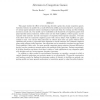Free Online Productivity Tools
i2Speak
i2Symbol
i2OCR
iTex2Img
iWeb2Print
iWeb2Shot
i2Type
iPdf2Split
iPdf2Merge
i2Bopomofo
i2Arabic
i2Style
i2Image
i2PDF
iLatex2Rtf
Sci2ools
116
click to vote
CORR
2008
Springer
2008
Springer
Altruism in Congestion Games
This paper studies the effects of introducing altruistic agents into atomic congestion games. Altruistic behavior is modeled by a trade-off between selfish and social objectives. In particular, we assume agents optimize a linear combination of personal delay of a strategy and the resulting increase in social cost. Our model can be embedded in the framework of congestion games with player-specific latency functions. Stable states are the Nash equilibria of these games, and we examine their existence and the convergence of sequential best-response dynamics. Previous work shows that for symmetric singleton games with convex delays Nash equilibria are guaranteed to exist. For concave delay functions we observe that there are games without Nash equilibria and provide a polynomial time algorithm to decide existence for symmetric singleton games with arbitrary delay functions. Our algorithm can be extended to compute best and worst Nash equilibria if they exist. For more general congestion g...
Related Content
| Added | 09 Dec 2010 |
| Updated | 09 Dec 2010 |
| Type | Journal |
| Year | 2008 |
| Where | CORR |
| Authors | Martin Hoefer, Alexander Skopalik |
Comments (0)

